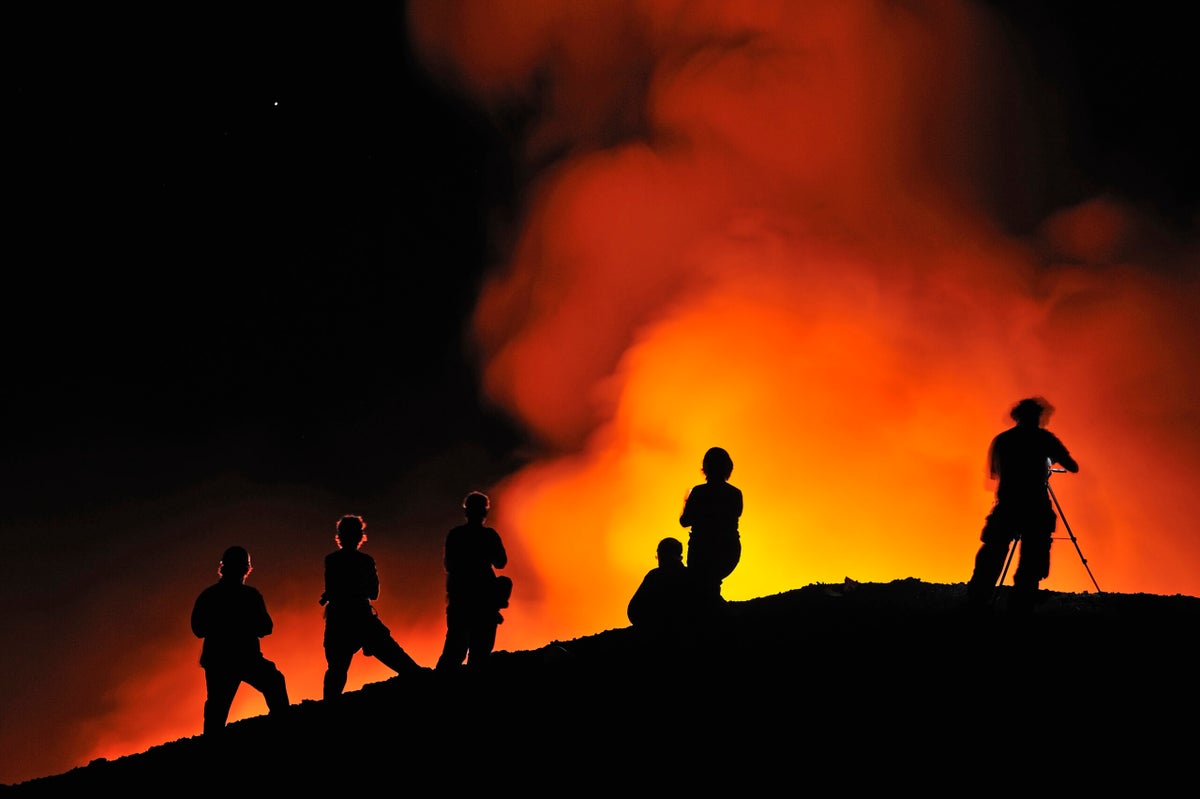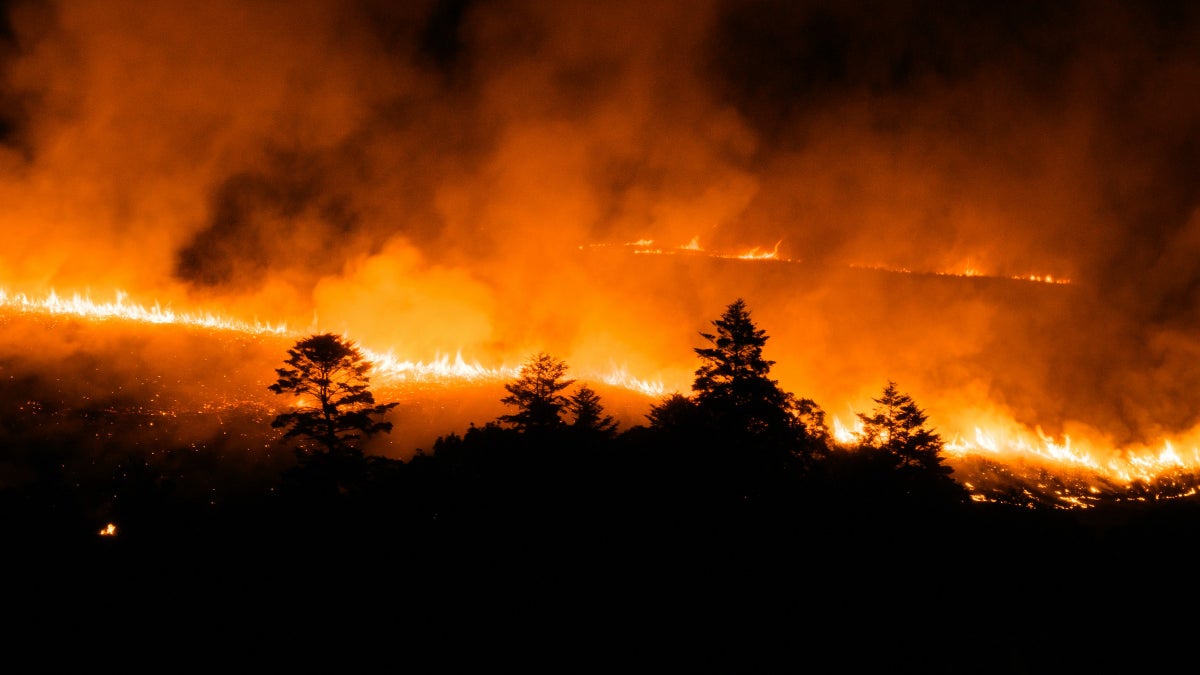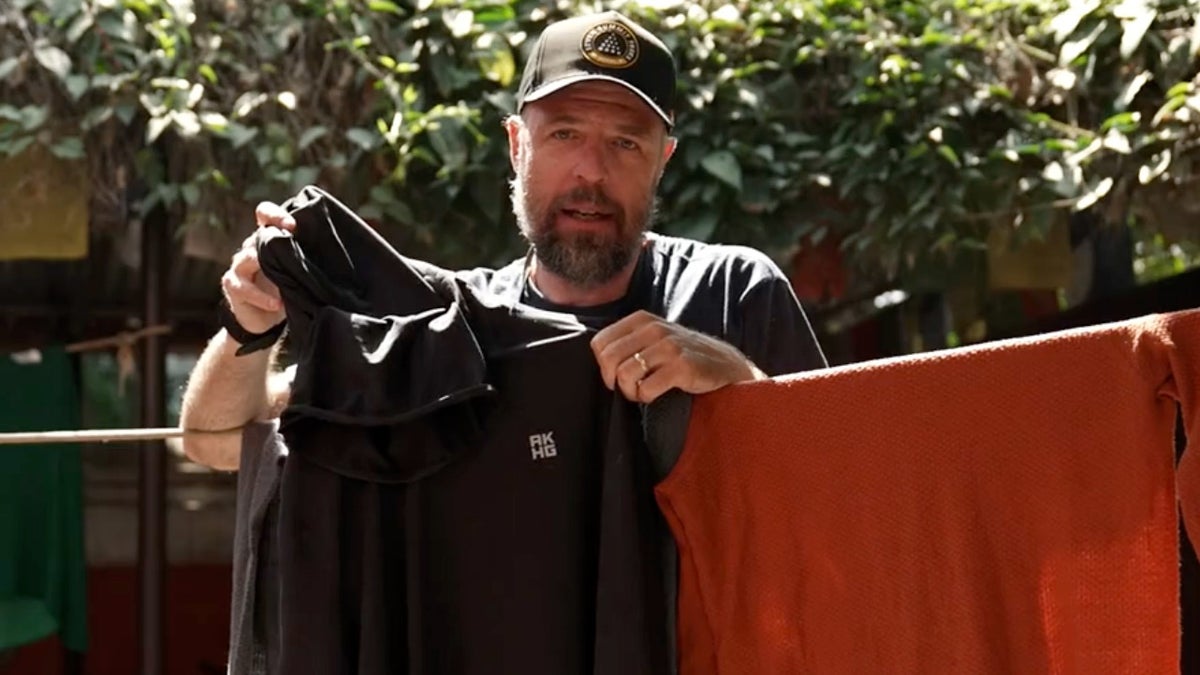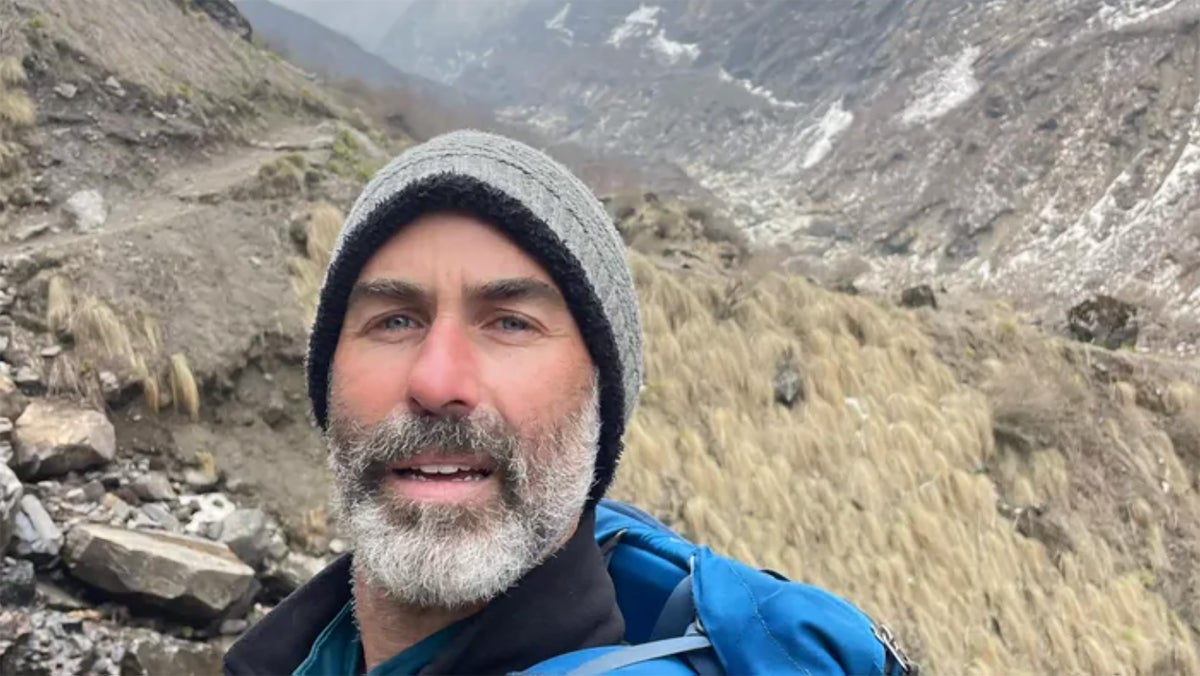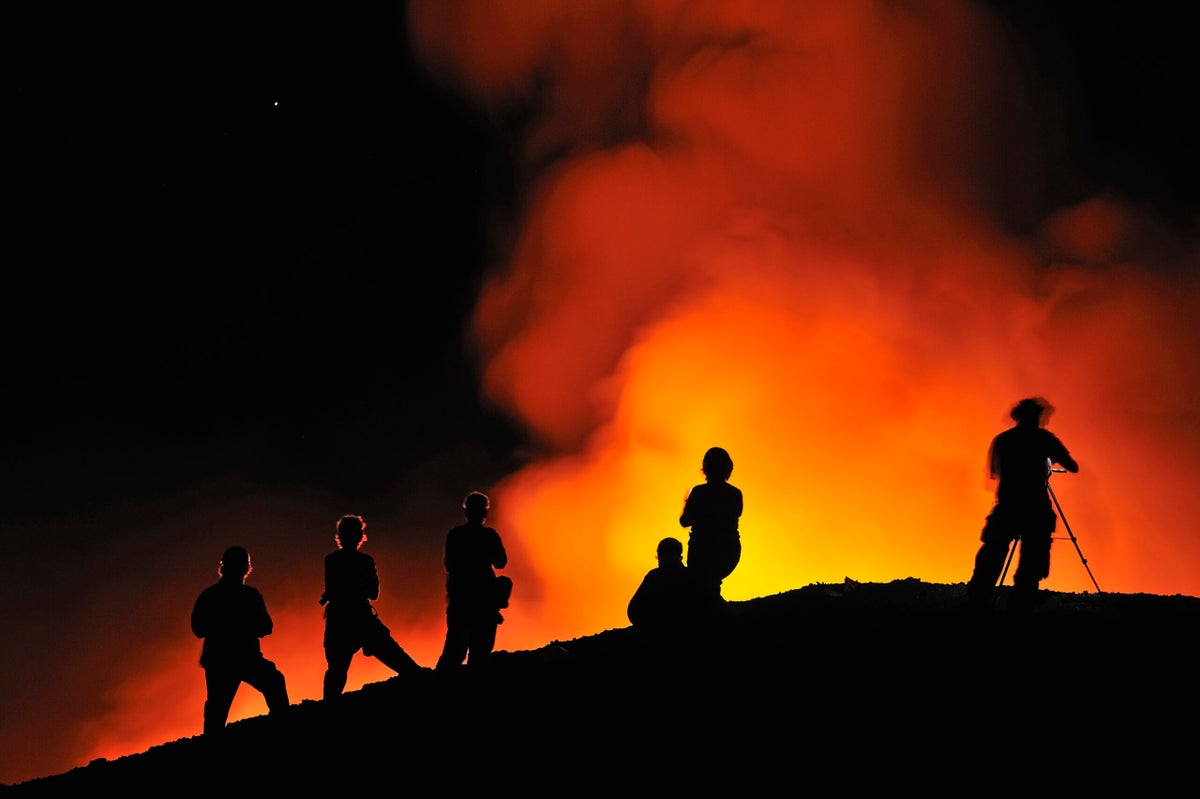
On June 11, the 1,000-plus-foot lava blasts of Kīlauea, one of the world’s most active volcanoes, nearly lured one visitor to his death. A 30-year-old Boston man fell 30 feet from a steep cliff after venturing off a trail to get a closer look at the volcano after dark at Hawai’i Volcanoes National Park. Luckily, a tree broke his fall, preventing him from plunging another hundred feet or so to the lava-strewn caldera floor. The impact of which could have resulted in his death, according to park officials.
The man, who did not have a flashlight or headlamp, sustained only minor injuries after the park’s search and rescue team performed a high-angle rescue.The mission involved rappelling down the steep, heavily vegetated cliff face and hoisting the man to safety.
Kīlauea’s recent eruption began on December 23, 2024. It’s the highest level of volcanic activity the park has seen in about 40 years. The result has been a “huge uptick” in visitation to Hawai’i Volcanoes National Park, according to park public affairs specialist, Jessica Ferracane. Park ranger Luke McNair says the June 11 incident was the second search-and-rescue mission since the eruption started.
I live part time on the neighboring island of Maui, and I admit I hopped a flight earlier this year so I could witness the glowing lava flows and billowing clouds of ash first-hand from the park trails. There’s something mesmerizing about watching the earth come alive before your eyes. I know not alone in this fascination. Ever since travel industry pioneer Thomas Cook took the first group of tourists to see Mount Vesuvius in 1841, volcano tourism has been a thing. And the onset of social media has fueled the rise of so-called “lava chasers,” says Dr. Adam Kent, a professor of geology at Oregon State University.
So far, there have been more than 50 volcanic eruptions worldwide in 2025. But while that may seem like a lot, Dr. Kent says that’s on par with the global average. “The most spectacular eruptions just so happen to be at some of the world’s most-known volcanoes,” he adds.
On May 15, Sakurajima volcano in Japan sent a nearly 10,000-foot plume of ash into the air. And Mount Etna, Europe’s most active volcano, erupted in spectacular fashion on June 2, sending a group of hikers sprinting down the mountain’s flanks as ashy clouds formed behind them. Other active volcanoes worldwide, including Nicaragua’s Concepción, Iceland’s Fagradalsfjall, and Chile’s Villarrica, are popular tourist lures.
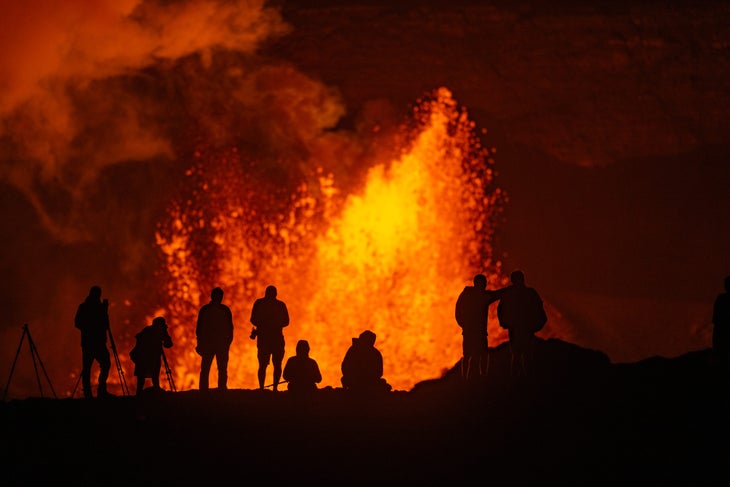
Alex Bradshaw, of Gotoku, a cultural-focused tourism agency in Japan, says that since the eruption, he’s seen a remarkable surge in demand for hiking expeditions across the Kirishima Mountain Range and cycling tours on Sakurajima. “It’s clear that travelers aren’t just coming for the dramatic scenery—they’re seeking a deeper connection with these living, breathing volcanoes,” he says.
That’s a feeling I can identify with. I skied to the smoldering summit of Chile’s Villarica, just months after its last consequential eruption in 2015. I’d booked the experience through a local outfitter, Chile Backcountry, and the ski resort, Pillán, closely monitors the volcano’s activity.
When I visited Kīlauea, I stayed on marked trails within the park and went to the park’s website in advance for notifications of closures and warnings. At the time, it felt reasonable. But given the recent accidents on Kīlauea, I wonder: During either of these past trips, was I being overly risky? Could I be taking more precautions when I visit volcanoes? I asked experts for their tips on how to safely visit a volcanic site. Here’s what they had to share.
Understand the Risks
“It’s important to remember that you’re in a dynamic environment where things can change quickly,” says Arianna Soldati, an assistant professor of volcanology at North Carolina State University. Rules are in place for a reason. It’s crucial to stay on marked trails and safely within viewing areas. Lava flows can be very unstable and collapse under your weight if you attempt to walk on them, says Soldati. “Hot lava might be flowing under the seemingly inactive surface.”
Volcanoes are essentially a mountain of rubble, says Ben Andrews, director of the Global Volcanism Program, an organization that maintains a website with a comprehensive listing of the world’s active volcanoes. “You need to be cautious of rockfalls, cliffs, and mudslides,” he says. “Rain or snowmelt can turn volcanic ash into a wall of liquid concrete weeks, months, even years after an eruption,” he cautions.
Toxic gases are another consideration. Scientists estimated that Kīlauea, for example, emitted up to around 83,000 tons of toxic sulphur dioxide per day during some of its recent eruptions, according to an update on the U.S. Geological Survey (USGS) website. The sulfur dioxide released from the volcano can mix with other gases and particles in the atmosphere to create a haze called volcanic smog (vog), and strands of windblown volcanic glass, named Pele’s hair after the Hawaiian goddess.
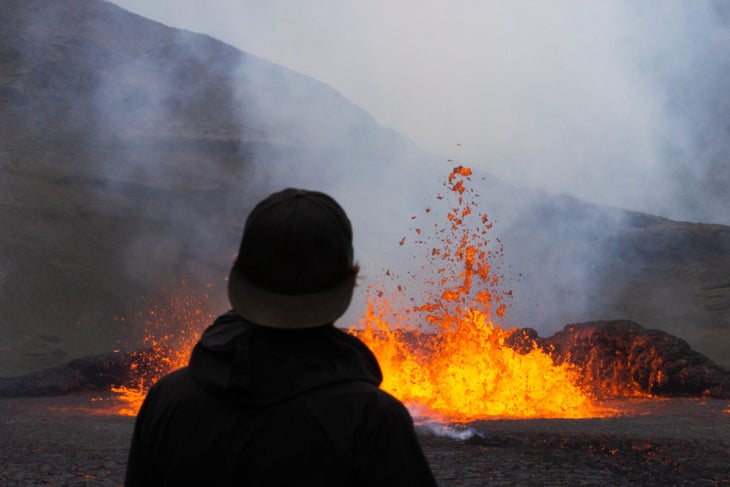
Inhaling either at high concentrations may cause respiratory problems and other health issues such as eye and skin irritation, according to USGS. Typically prevailing winds carry the toxic particulates away from the park, but when the weather is calm, local air quality can suffer, states Katie Mulliken, a USGS Hawaiian Volcano Observatory geologist. If you see people wearing masks and helmets on guided tours, you probably should not be exploring the place by yourself, says Soldati.
Even inactive volcanoes pose dangers. “Dormant doesn’t mean safe,” says Harding Bush, associate director of security operations at Global Rescue. “A volcano can shift from quiet to deadly with little warning, like a sleeping giant that wakes without notice. Tourists need to be alert and prepared. Even when a volcano appears calm, the environment around it is anything but. It’s like standing on a frozen lake in spring—the surface may look solid, but danger lurks beneath.”
Dr. Kent cautions that a safe viewing distance can vary from a few meters to many kilometers depending on the type of eruption. “My number one suggestion would be to follow advice from local authorities,” he says. When it comes to photos, Maui-based photographer Daniel Sullivan of Indigo Gallery recommends using a tripod and trying to use different shutter speeds to capture different shots. On the Big Island, he says it’s important not to get too close to the action. “The park rangers have barricades in place to show you where you can shoot from,” he says. “Unfortunately people are constantly ignoring these and bad accidents do happen.”
Review Updates from Local Resources
The exact timing of an eruption can be tricky to predict, but it’s unusual for travelers to be caught completely off guard by volcanic activity, thanks to advanced scientific forecasts. The Global Volcanism Network puts out around 15 to 25 detailed weekly reports per week on recent eruptions. “We’re a wonderful clearinghouse but I still tell people to check with local volcano observatories, civil authorities, and local park services,” says Andrews. In the U.S., the USGS Volcano Hazards site monitors volcanoes and issues warnings. In Iceland, the equivalent service is the Catalogue of Icelandic Volcanoes that lists active volcano hazards. In Sicily, the Civil Protection Department and the Italian Institute of Geophysics and Volcanology provide the public with updates on Mount Etna’s eruption status using a color-coded system.
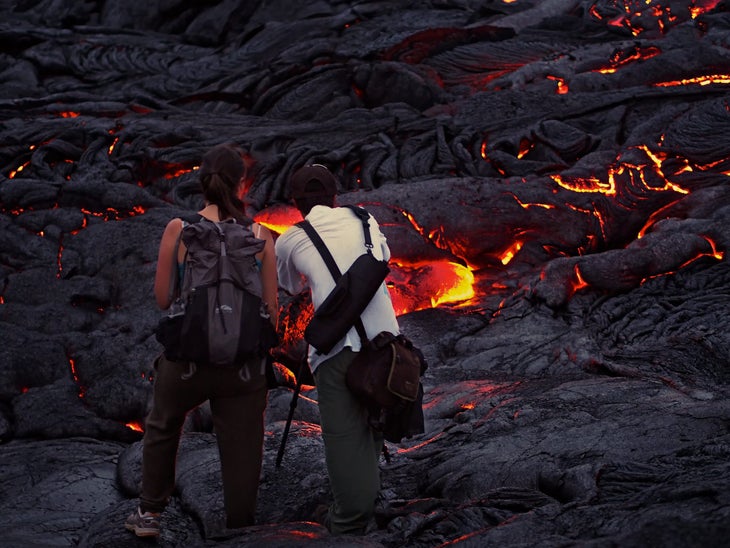
Be Prepared
“Treat a volcano with the same respect you would a big mountain,” says Andrews. Dress like you would for a hike with sturdy boots, extra layers, sun protection, a headlight, drinking water, and a high-vis vest. Summits can be chilly and rainy, so pack a rain jacket. “Consider whether you’ll have cell coverage,” says Soldati. “If so, make sure you conserve battery for actual emergency communication versus picture-taking.” Soldati recommends downloading the app What3words to ensure you can describe your location in case of an emergency.
“Stay alert for anything that looks, sounds, or smells unusual, and if things seem off, leave as quickly as possible,” says Soldati. “Try to avoid valleys if at all possible, as those will be preferential paths of lava flows. If an eruption starts, do not waste time capturing it with your phone.”
Also keep in mind that eruptions can impact travel. Airports may close, and roads can become impassable due to ashfall. “Travelers should be prepared to change plans quickly and use alternate routes by land, sea, or air if needed,” said Bush. “I was stranded in Anchorage for days trying to get to Kodiak Island while there was an eruption 160 miles away on the Kenai Peninsula of Alaska.”
Go with a Pro
Activities like lava-field hikes, crater tours, and eruption viewings offer a front-row seat to nature’s most powerful spectacle. Consider experiencing them with an expert on a guided tour that can provide historical and geological context. Hawai’i Volcanoes National Park, offers free ranger-led educational programs nearly every day on Kīlauea volcano..
“It only takes a little homework to be safe,” says Andrews. “Visiting a volcano should be an awe-inspiring experience, not a death-defying one.
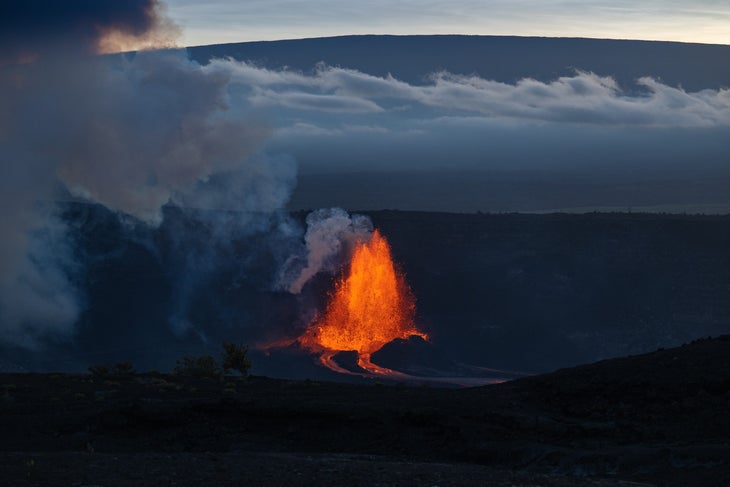
Lava Gaze Safely on These Guided Volcano Hikes
Travelers can book tours with certified guides who specialize in volcano hikes:
Hawaii: Get two distinct views of Kīlauea on the Volcanoes and Waterfalls by Air and Land trip from Hawaii Forest & Trails. Soar above Hawaii Island’s dazzling volcanic formations with Blue Hawaiian Helicopters then trek through the national park with an expert who knows just how close to snap pics of lively Kīlauea. From $1,009
Chile: Climb Chile’s most active volcano Villarrica with Amity Tours during an eight-day tour of the Lake and Volcano District. The approximate five-hour trek to the summit rewards hikers with views across the live crater and out to five lakes. From $4,870
Italy: Etna Experience leads full-day hikes, consisting of five to six hours of trekking, in routes that are safe both during active and quiet phases of the volcano. From $70
Guatemala: Local operator Lava Trails offers overnight guided group treks to the 12,360-foot fiery ridge of the Acatenango volcano, with the option to tack on a 90-minute sunrise hike to the summit the following morning. From $94
Iceland: Walk near newly formed lava fields and witness steaming fissures with Arctic Adventures. The outfitter’s half-day hike from Reykjavik showcases the major changes that the Sundhnúkur, Fagradalsfjall, and Meradalir eruptions made to the landscape between 2021 and 2024. From $120
Japan: Spend 15 days trekking around Kyushu, nicknamed the Land of Fires for its plentiful volcanoes, with outfitter Oku Japan. Take in views of the world’s largest volcanic caldera at Mount Aso and soothe sore muscles in volcanic sand baths and onsens. From $6,035
Jen Murphy is a regular contributor to Outside. This past winter she went ski touring past the stinky fumaroles of Asahi-dake, an active volcano in Hokkaido, Japan.
The post For Lava Chasers, Is the Thrill Worth the Risk? appeared first on Outside Online.











